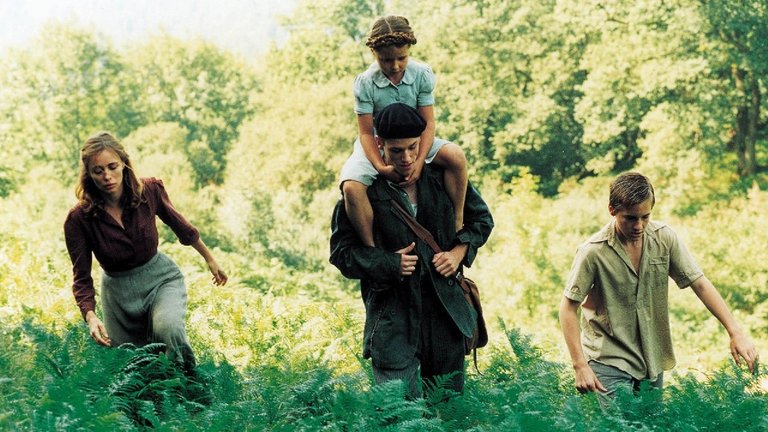Retro Film Review: Strayed (Les Égarés, 2003)

Two decades ago, fuelled very much by French unwillingness to join US crusade to bring benefits of democracy to Iraq through military force, a rather unsubtle propaganda campaign created myth of the French as people devoid of any martial virtues or French history lacking any military accomplishments. Much of the basis for such claims was found in France’s surrender to Nazi Germany in June 1940, an event that serves as a backdrop for Strayed, 2003 drama directed by French director André Téchiné.
In the first months of Second World War France was actually quite serious about fighting Germans, or at least serious enough for the protagonist Odile (played by Emmanuelle Béart) to lose her husband in one of the border clashes. The plot begins in June 1940 after the Germans have invaded Low Countries, surprised the Allies and smashed through French defence lines. Paris is being evacuated and the roads heading south are clogged by endless lines of refugees who not only block military movements and make any meaningful defence impossible, but also serve as easy pickings for Luftwaffe pilots that create mayhem, destruction and panic. In one of such raids, Odile, who had been trying to reach safety with her 13-year old son Philippe (played by Gregoire Leprince-Riguet) and 7-year old daughter Kathy (played by Clémence Meyer), have lost the car. They are being rescued by Yvan (played by Gaspard Ulliel), resourceful blue-collar youth who advises them to take much safer route through woods and back roads. His advice is taken rather reluctantly, just as he reluctantly takes the role of protector and food provider. Finally, they reach the abandoned country house in middle of nowhere. Odile finds not only food but some sort of middle-class normalcy she had abandoned in Paris, while Yvan becomes some sort of substitute father to their children. This idyll, however, doesn’t take long because Yvan becomes increasingly nervous about someone else, and especially authorities, coming to the house.
Unlike most World War II dramas, Strayed, based on The Boy with the Green Eyes, semi-autobiographical novel by Gilles Perrault, eschews spectacle in favour of subtlety, allowing the true horror of wartime trauma to seep slowly into the narrative. Actual carnage is seen only in beginning, but the real psychological impact of those horrors displays itself gradually and through the set of very revealing episodes. Scenes depicting the journey through verdant landscapes serve as haunting reminders of the fragility of civilisation, even as the characters struggle to survive._
At its core, Strayed excels in its characterisation, exploring the devastating effects of war upon individual lives and the broader sociopolitical landscape. Extreme situation in which protagonists find themselves is excellent opportunity for Techine to explore how war destroys not only lives, but also the delicate fabric of the modern society, forcing two different worlds to mix in unexpected ways. Odille, brilliantly played by Emmanuele Béart, who used to be respected member of society, is utterly lost without that society and forced to depend on someone she could have scorned under normal circumstances. On the other hand, Yvan, sees the collapse of society as an opportunity to turn the tables and once in life enjoys many things which had been denied to him. Yet, he, just like Odillle, can’t overcome boundaries set by his previous life, especially because of his immaturity that would be revealed in most unexpected ways – both during the obligatory love scene and during the film’s shocking ending.
The ending of the film is also shocking in another way, at least to the audience accustomed to Hollywood version of WW2. The film provides some sort of closure at the historical point in which conventional WW2 film would only begin. This might look like a surprise, but it works perfectly in the context of Strayed – what looks like a disgrace from historical perspective, looks perfectly normal from the perspective of protagonists.
Regrettably, Téchiné's decision to interject documentary footage disrupts the film's immersion, breaking the narrative flow and undermining the gritty realism that defines Strayed. Nonetheless, the film remains a powerful testament to the enduring capacity of art to challenge preconceived notions and provoke contemplative reflection._
Ultimately, Strayed leaves audiences pondering the question: How would we respond if our own nations found themselves embroiled in similar turmoil? By inviting us to share the harrowing experience of Odile and Yvan, Téchiné compels us to consider the depths of human resilience and the potential cost of complacency._
RATING: 6/10 (++)
(Note: Original version of the review is available here.)
Blog in Croatian https://draxblog.com
Blog in English https://draxreview.wordpress.com/
InLeo blog https://inleo.io/@drax.leo
Hiveonboard: https://hiveonboard.com?ref=drax
Rising Star game: https://www.risingstargame.com?referrer=drax
1Inch: https://1inch.exchange/#/r/0x83823d8CCB74F828148258BB4457642124b1328e
BTC donations: 1EWxiMiP6iiG9rger3NuUSd6HByaxQWafG
ETH donations: 0xB305F144323b99e6f8b1d66f5D7DE78B498C32A7